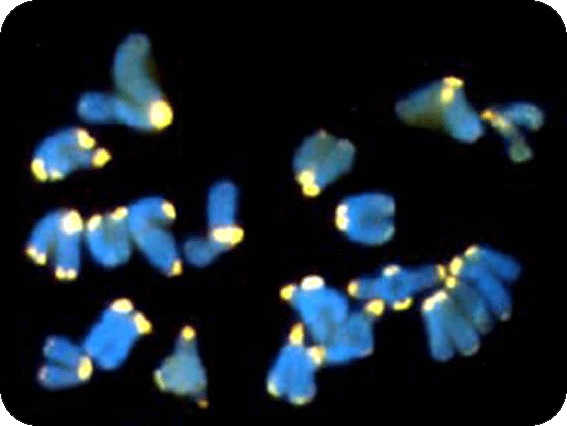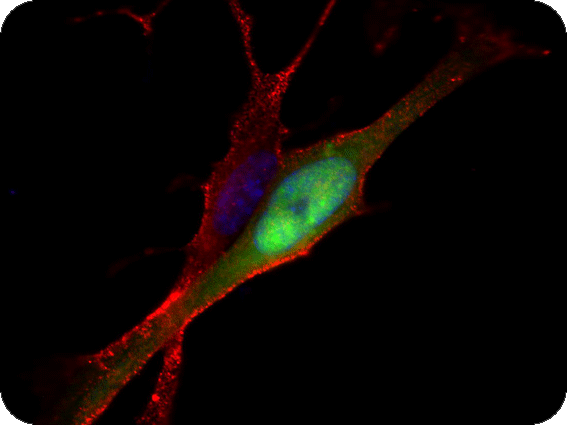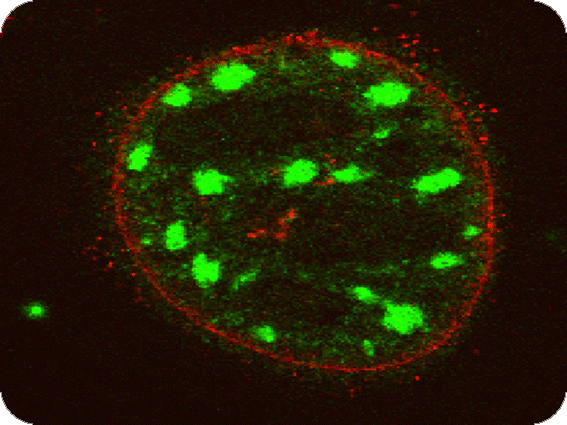Lectures and practical classes on this website are divided into four main areas that the Department covers in its teaching (Genetics, Molecular and Cellular Biology, Microbiology and Virology); however, this division is approximate, and many courses span multiple areas or even overlap with courses taught by other departments. The links lead to the Study Information System, where you can find detailed descriptions, syllabi, and other relevant information. The majority of lectures and courses are taught in Czech only; those taught in English are marked in bold within the following paragraphs .
Genetics
 Specialized lectures in various fields of genetics are provided by both internal and external lecturers from the Department. Students enrolling in these courses should already have a solid foundation in general and molecular genetics and biology.
Specialized lectures in various fields of genetics are provided by both internal and external lecturers from the Department. Students enrolling in these courses should already have a solid foundation in general and molecular genetics and biology.
The English lecture course Recent Achievements in Genetics (MB140P19E) introduces students to the latest findings in immunogenetics, gene therapy, genetically modified organisms, human genetics, epigenetics, and more. It is held annually, contrary to its Czech variant MB140P19 (offered only every two years!).
Cytogenetics (MB140P05) can be taken by advanced undergraduate students, as well as Master’s and Doctoral students interested in the biology of eukaryotic chromosomes, with a focus on the molecular aspects of their structure and function, and the methods used to study them. This lecture is accompanied by the Practical Course from Cytogenetics (MB140C05), where students can try and learn various techniques used in the analysis of plant and animal chromosomes (the course has a limited capacity each year!). The lecture series Advances in Molecular Cytogenetics (MB140P10) is a follow-up to the basic lecture on cytogenetics. It emphasizes the latest research findings, methodological developments, and the integration of cytogenetics with other scientific disciplines (this lecture is held every two years).
Human Genetics (MB140P07) is a lecture focused primarily on special methods and techniques in human genetics, introducing students to the latest research in this field at the molecular and chromosomal levels. Students who enroll in the lecture DNA Diagnostics in Clinical Practice (MB140P90) will have the opportunity to learn about the most common types of DNA testing currently performed in clinical laboratories. The lecture also includes a practical mini-course and a visit to a clinical laboratory. The principles, mechanisms, and potential applications of gene therapy are covered in the specialized lecture Gene Therapy (MB140P93).
One of the founders of forensic genetics in the Czech Republic shares his experiences in the lecture Forensic Genetics and Biology (MB140P49), where students can learn about the process of biological material identification in forensic genetics and related fields, both from the perspective of methodologies and procedures used, as well as from the perspective of quality assurance and legal framework.
Plant Genetics (MB140P02) is devoted to the characteristics of the plant nuclear and extranuclear genome, its structure, organization, and plant-specific features of gene expression regulation (the lecture is held every two years!).
Another lecture series, Methods of Functional Genomics (MB140P86) covers topics such as sequencing, annotation, and functional genome analysis, crossing over into the areas of molecular biology and bioinformatics (this course is taught in English by leading experts from EMBL and is held in collaboration with the University of South Bohemia in České Budějovice). Part of the seminar Molecular and Cell Biology Methods (MB140S79) is also dedicated to methods for studying DNA, gene expression, and genetic manipulation of model organisms.
Molecular and Cellular Biology
 The lecture series Molecular Biology of RNA (MB140P44) offers, in addition to current findings in genomics and molecular biology of eukaryotic organisms and their viruses, a detailed introduction to the mechanisms of post-transcriptional regulation of gene expression and translation.
The lecture series Molecular Biology of RNA (MB140P44) offers, in addition to current findings in genomics and molecular biology of eukaryotic organisms and their viruses, a detailed introduction to the mechanisms of post-transcriptional regulation of gene expression and translation.
The lecture Cell Cycles and Signalling (MB140P29) introduces students to the basic mechanisms involved in the regulation of the cell cycle, cell differentiation, and some other cellular processes, using examples from prokaryotic and eukaryotic microorganisms (the lecture is held every two years!).
Students can become familiar with various modern methods of molecular and cell biology, genomics, and proteomics through theoretical lecture cycles and seminars, such as the lecture series Methods of Functional Genomics (MB140P86) (see above), which focuses primarily on methods of genomics, proteomics (and related bioinformatics analysis), and flow cytometry; the seminar cycle Molecular and Cell Biology Methods (MB140S79), which covers a broader spectrum of methods for working with DNA, proteins, and cells, as well as microscopic, fluorescence, and spectral analyses; and finally the lecture From Genome to Proteome (MB140P62), which focuses on various aspects of microbial proteomics.
The practically oriented lecture DNA Diagnostics in Clinical Practice (MB140P90) introduces students to the molecular biological methods used in prenatal and preimplantation diagnostics in humans, investigation of congenital genetic disorders, and characterization of solid tumors. The lecture Gene Therapy (MB140P93) familiarizes students with the application of modern knowledge from molecular biology, virology, immunology, and oncology into clinical practice.
The latest advances in gene expression are conveyed to students in an interactive and critical format in the English-taught lecture/course Everything you wanted to know about gene expression but were afraid to ask (MB140P27) (the capacity is limited each year!).
The three-day practical course Methods for Gene Expression Determination (MB140C76) introduces students to the most common methodological approaches for detecting and quantifying the various stages of gene expression, with a special focus on quantitative PCR and RNA work (the course capacity is limited each year!). The week-long Molecular Biology and Virology Practical Training Course (MB140C77) offers, in addition to basic molecular biology techniques, more advanced methods currently used in research and diagnostic biomedical laboratories (the course capacity is limited each year!). The two-week-long Practical Course in Molecular Genetics (MB140C39) (the course capacity is limited each year!) is intended for both advanced undergraduate and Master’s students. Here, they can learn basic and advanced molecular biology techniques for both prokaryotic and eukaryotic organisms.
The week-long practical course Fluorescence spectroscopy in biology (MB140C75E) (the course capacity is limited each year, and students must pass an entrance test!) specializes in various fluorescence spectroscopy methods applicable in biological disciplines. The course is also available in its Czech variant MB140C75. Another four-day practical course in English is Molecular Cloning (MB140C38), where students will learn about molecular cloning of genes (designing a cloning strategy, inserting the selected gene into an expression vector, verifying the resulting construct, and expressing the selected protein in a bacterial expression system). English is also the language of the course Basics of Flow Cytometry (MB140P50), which combines theory and practice, allowing students to learn the basics of flow cytometry and try working with different types of these instruments.
Microbiology
 The Department of Genetics and Microbiology offers a variety of lectures specializing in different areas of microbiology. Most of these lectures assume that students have a strong background in microbiology and biochemistry.
The Department of Genetics and Microbiology offers a variety of lectures specializing in different areas of microbiology. Most of these lectures assume that students have a strong background in microbiology and biochemistry.
For Ph.D. students and advanced Master's students, the lecture Advances in Molecular Genetics of Bacteria (MB140P45), is designed to introduce current trends in research related to molecular biology and bacterial genetics (this lecture is held once every two years!). The lecture is conducted by a team of specialists in the field.
The lecture Physiology of bacteria II (MB140P32) builds upon the undergraduate course Physiology of bacteria I and delves deeper into topics such as bacterial genetic information, its organization, and expression, as well as other subjects related to the life cycle of these microorganisms.
Other lectures focus on various aspects of pathogenic bacteria. The lecture Medical Microbiology (MB140P70) covers the basics of bacteriology and virology of human pathogens (with special emphasis on nosocomial infections) and also introduces the fundamentals of serology. The lecture Antibiotics (MB140P60) familiarizes students with the basic chemical structure of these substances, their mechanisms of action, and the genetic basis of resistance to them. The goal of the English-taught Principles of Bacterial Virulence (MB140P35) is to understand the diversity of mechanisms used by pathogenic bacteria during colonization and transmission among hosts.
Biology of the Yeasts (MB140P24) explores various aspects of the genetic information, life cycle, metabolism, taxonomy, ecology, and practical use of the simplest eukaryotic microorganisms - yeasts. The five-day practical course Practical course in biology of the yeasts (MB140C24E) provides students with hands-on experience in various techniques for working with yeast cells and colonies (the course is conducted in English and has limited capacity each year!). A slightly longer six-day course Practical Course in Molecular and Cell Biology of the Yeasts (MB140C29) expands on these techniques, including work with differentiated multicellular structures formed by yeasts (course capacity is limited each year!). The Experimental Mycology (MB140P59) lecture focuses on specific techniques necessary for working with laboratory cultures of fungi and studying various processes occurring in these microorganisms. The lecture is accompanied by practical course (its capacity is limited each year!). The English-taught course Fungal Pathogens and Interaction with their Hosts (MB140P31E), supplemented by weekly two-hour practical sessions, covers various strategies of fungal pathogen interactions with their hosts.
Industrial Microbiology (MB140P25) introduces students to industrial technologies that utilize various microorganisms, as well as current trends in the searching for and cultivation of microbial producers of various substances. The lecture includes a one-day excursion to a brewery and a microscopy practical focused on micromycetes. Various aspects of the biology of recombinant microorganisms and the construction of industrial recombinant strains are covered in the lecture Recombinant Microorganisms in Biotechnology (MB140P63). This lecture is complemented by the Practical Course in Recombinant Microorganisms in Biotechnology (MB140C63), which takes place at the Institute of Microbiology of the Czech Academy of Sciences (course capacity is limited each year!).
The lecture Geomicrobiology (MB140P84) (held once every two years!) introduces students to the processes mediated by microorganisms in natural soil or aquatic environments (carbon and nitrogen fixation, organic matter decomposition, biogeochemical processes).
Another lecture, Evolution and Systematics of Prokaryotes (MB140P14), provides a comprehensive overview of current knowledge on the evolution of bacteria and archaea and their taxonomy.
The English-taught course Bioinformatics and Microbiome Analysis (MB140P94) deals with the main approaches to analyzing microbial communities, primarily based on next-generation sequencing technologies.
The lecture From Genome to Proteome (MB140P62) provides a theoretical introduction to the methods used in proteomic analyses of microorganisms. The week-long practical course Fluorescence Spectroscopy in Biology (MB140C75E) (course capacity is limited each year, and students must pass an entrance test!) offers the opportunity to learn and practice various techniques and methods of fluorescence spectroscopy that can be used in microbiological research. The course is also available in its Czech version MB140C75.
Virology
 The English-taught lecture Progress in Molecular Virology (MB140P82) offers students the latest insights into the molecular biology and genetics of viruses.
The English-taught lecture Progress in Molecular Virology (MB140P82) offers students the latest insights into the molecular biology and genetics of viruses.
In the lecture Viruses and the Immunity System of the Host (MB140P72), students can learn about the various mechanisms of innate and adaptive immune responses to viral infections, the development of virus-induced immunopathological conditions, the development of antiviral vaccines, and the immunological aspects of gene therapy using viral vectors. The lecture Pathogenesis, Epidemiology and Diagnostics of Selected Human and Animal Diseases (MB140P85) focuses on viruses that cause common diseases, with particular emphasis on diagnostic methods and epidemiological aspects of this issue. The English-taught lecture Molecular and Immunologic Mechanism of Viral Pathogenesis (MB140P91) is an advanced course primarily focused on viruses that cause various human diseases. The courses Advances in Infection Biology I (MB140S50E) and Advances in Infection Biology Ib (MB140S53E), both conducted in English, are designed to develop skills related to reading and understanding scientific literature related to various aspects of infectious agents concerning human health.
The specialized lecture Plant, Fungal and Bacterial Viruses (MB140P96) covers the "less famous" yet equally fascinating viruses found in bacteria, plants, fungi, protists, or invertebrates; these viruses together account for more than half of all known virus species! The lecture is conducted in English.
In the lecture/course Viruses and Tumors (MB140P87) (held once every two years!), students interested in molecular and cellular biology, virology, and oncology can learn more about known molecular mechanisms of tumorigenesis, the role of viruses in studying the molecular basis of tumor development, their treatment, and potential therapeutic targets. The lecture Gene Therapy (MB140P93) introduces students to the use of viral vectors for introducing genetic material into human cells, as well as the use of gene therapy in oncology and its relationship to oncolytic viruses. The advanced lecture series Antiviral Drug Discovery (MB140P97) familiarizes students who wish to expand their knowledge in virology and medicinal chemistry with current antiviral drugs.
The fourteen-day-long Practical Course in Virology (MB140C70) can be taken by students in the later years of their Bachelor's studies or as part of their Master's studies (course capacity is limited each year!). This intensive course offers the opportunity to gain practical experience in working with tissue cultures, isolating, purifying, and quantifying viruses, analyzing viral products, preparing samples for electron and confocal microscopy, and more. Virology Laboratory Course for Epidemiologists (MB140C73) is designed for students of the follow-up Master's programme in Social Epidemiology (course capacity is limited each year!). Practical Course of Diagnostic Methods in Virology (MB140C85E) can be enrolled as a one-week addition to the MB140P85 lecture (see above); this practical course allows students to get hands-on experience with methods used for detecting viruses in clinical materials (course capacity is limited each year!). The equivalent course MB140C69 is taught in Czech. The one-week practical course Viral Biotechnology (MB140C67), also conducted in English, focuses on the basic principles of viral expression systems and their potential use for expressing recombinant proteins or producing viral particles.





















